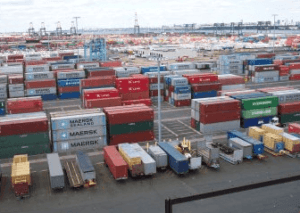Ghana ports expected to see more cargo volumes in 2020
 Ghana’s ports will anchor increases in cargo volumes in 2020 following the positioning of Tema and Takoradi Ports as transhipment and oil and gas hubs respectively.
Ghana’s ports will anchor increases in cargo volumes in 2020 following the positioning of Tema and Takoradi Ports as transhipment and oil and gas hubs respectively.
Mr Michael Luguje, Director General, Ghana Ports and Harbours Authority (GPHA), making the projections, said the Authority had made major investments to enable Ghana’s ports to serve as an incentive for the facilitation of intra-African trade, following the implementation of the African Continental Free Trade Area
Mr Luguje indicated that “We have positioned our ports for global trade, and while we do that we also are looking forward to more intra-African trade going maritime,” he disclosed.
He revealed that the Port of Tema for instance had been positioned as the best in terms of infrastructure in the West and Central African sub-region.
“If you look at port infrastructure in the perspective of container capacity, Ghana is leading today in West and Central Africa,” he said.
He projected that with the operationalization of the Meridian Ports Services (MPS) terminal three within the Tema Port and the Takoradi Port’s expansion to do more in the oil and gas services, Ghana would attract more maritime businesses in the year 2020.
He indicated that the MPS Terminal 3 within the Tema Port, operated on a first come first serve basis and therefore did not prioritize certain shipping lines, hence, giving the Tema Port a competitive advantage over other ports.
“MPS Terminal 3 is an independent multi-user terminal. You come and you are served based on your berthing window; the one who comes after you must wait. MPS is open to anyone who has container to come and load or offload in Tema Port,” he said.
Mr Luguji revealed that the investment made so far into the Port of Takoradi would boost its import handling capacity comparable with that of Tema while augmenting its interventions to grow that of the export sector.
He said they were expecting that, with all the expansion projects going on and the kind of direction the Western Region was going in the Oil Industry growth, “we are going to see, in the coming years, Takoradi as an alternative port for import. It is going to give Tema a very good competition,” he added.
Assessing the ports performances in 2019, he described the last year as a productive one in spite of the many challenges that faced the maritime industry.
“We have not had December’s report yet but looking at January to November’s figures we are fortunate to see Tema Port’s total throughput growing by about 5% compared to 2018 and Takoradi recording about 21 per cent compared to 2018,” he said.
Touching on transit trade, he described it as the most competitive part of the port business saying the Port Authority was doing a lot, including applying competitive tariffs, to woo cargo bound for the landlocked countries through the Ghanaian corridor.
Mr Luguje said in 2019, they needed to reach out to the landlocked countries once again to discuss quite a number of things and exchange a lot of information explaining that even though his outfit got a lot of feedback on the type of service they provided, the quality of the service and challenges of the trade, sometimes it was important to meet them at their own doorstep, where their businesses were established for the sharing of better experiences.
The GPHA Director General urged the Customs Division of the Ghana Revenue Authority (GRA) to reconsider its decision to charge 17.5 per cent VAT on transit cargoes saying it was a challenge the transit countries had lamented about.
“Normally transit cargo services should not have attracted VAT but unfortunately the GRA insists that VAT should be charged on tariffs for transit goods. The VAT is 17.5 per cent which is quite significant. This is the major complaint of the importers and exporters of landlocked countries,” he said.
Mr. Michael Luguje also advocated for the improvement of Ghana’s rail infrastructure to give the country a major competitive advantage in the transit business and also called for the revamping of the Tema Shipyard and Drydock.
“The advantage we have is that if you have your shipyard close to your ports working well, what it means is that Shipping Lines can plan that we will just go and offload our cargo at Tema Port and quickly go to dry-dock for repairs. This is advantageous because Shipping Lines will not say that they will not go and offload cargoes in Tema and sail empty to a faraway shipyard for repairs,” he revealed.
Source: GNA
